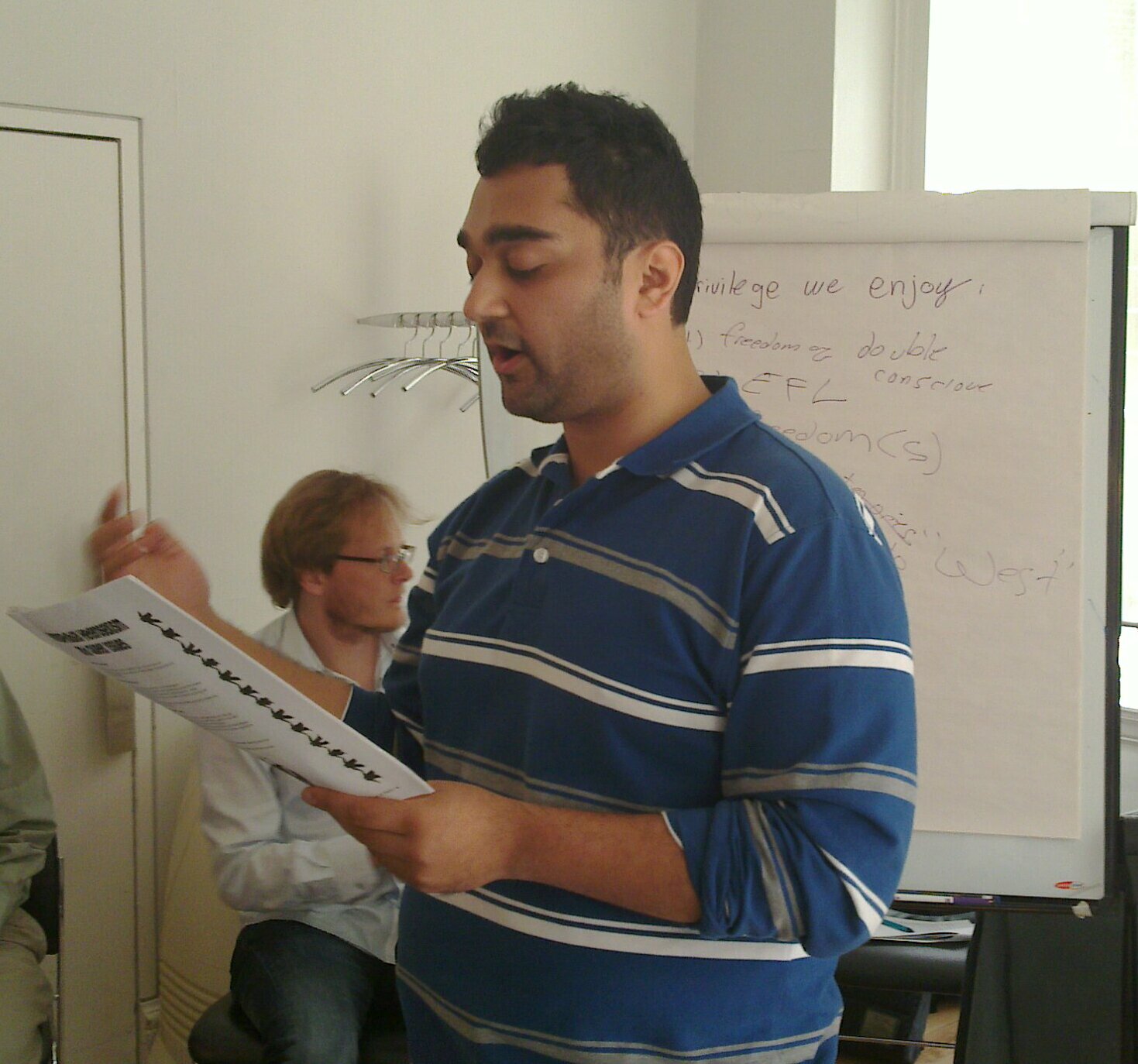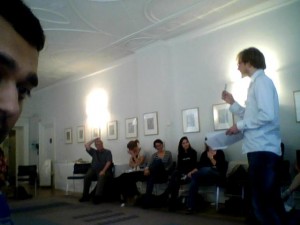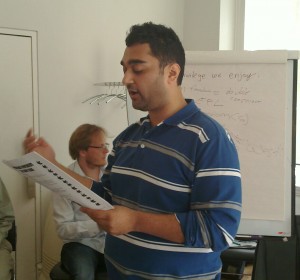Andres: I love this community. So much energy. Dani: Get so much more out of this conf than others. Lizzie: Want to work with Oz faculty about incorporating SJ themes. Juan: I have invited Lizzie to come Colorado and talk to us. Also exited about this exercise about privilege. Jen: Exited about all the interesting people. Jon: Grateful, I’ve learned so much in these days. Sad when it will be over. Mathew: Feeling practical. Wondering how themes from conversations here can be integrated to the wider engineering stream. Dean: Not looking forward to going back and plug in the normal academic routine. This is the best conference. Caroline: Sad to see all my friends going. Hopeful to see what we can do at a distance. Exited about that we are doing this exercise.
Category Archives: Live from the 2010 Conference
Usman speaking about racism…

Moving into the cosmos
Caroline led us in thinking about us as a “movement”. She asked Katy to create a liminal space out of the people at the conference to represent what she felt about ESJP. This resulted in the next 10 or so minutes with Katy silently arranging people to create a “living sculpture”. Caroline then invited attendees to share their feelings on what it felt to be included in the space and not included in that space. This was a technique from the “theatre of the oppressed” as theorized by Boal.
ESJP as a movement:
Then the conference participants were encouraged to go talk to their critical friend about goals for this conference. Katy cited the lack of industry partners as a point of concern, while others felt that their goal of learning more was very much reached as there was lots of information to process. My critical partner had the goal of rejuvenating during the conference by meeting old and new friends, which she did meet during the conference. Dean was interested in contributing to the sustainability of the ESJP community during the conference. Lizzie felt that she had several critical conference friends and they contributed greatly to her thinking.
Caroline pointed to Donna to address the critique of industry partners being absent. Donna said that “During this conference, many forms of oppression were put on the table like racism. It doesn’t mean white people aren’t welcome, it just means they have to acknowledge racism and deal with it. In the same way, capitalism is a form of oppression. Folks from industry are welcome as long as they are willing to critique capitalism”.
Caroline says that ESJP must allow those who are members of this “community” or “movement” to critical engage with dominant discourses in engineering and challenge the “business as usual” model in the engineering world. Dean added that it’s not just being critical of the corporate world but also critical of dominant institutions and structures.
Caroline addressed the issue of tension between newcomers to the social justice space and those who have more experience with it. Then she talked about ongoing activities in the ESJP network:
- PAR Research – Dean’s PAR project
- Book series
- Workshops
- Zine
- Online modules
- Next Conference
Q&A for Session 2 (Juan and Jen’s presentations)
Doug: The engineers have supplied to the business community a reason for reducing smoke in their own terms. But it doesn’t actually deal with the exploitive nature of those businesses. You shouldn’t reduce smoke just because it makes business sense.
Peter: The business case solution doesn’t provide a long-term solution. But we should ask ourselves if it works towards justice right now? It’s not a great long-term or complete solution, but it works towards that goal.
Jen: There’s a tension in the case of Rico between the community and the greater community of those who will be supplied with the electricity.
Donna: Energy deregulation in the US has caused many problems. You have deregulation without competition so energy is very expensive and controlled by monopolies.
Jen: Rico is not a wealth community so they could not run a energy coop like some other communities in Colorado.
Lily: I’m from Engineers against Poverty and we work to make the “business case” in the developing world because we think it’s important.
Arias: I’d love to see more of these histories but I think engineers sometimes concentrate too much on the technical fix and not enough in defining the problem.
Darko: I think we need to make the business case because they won’t change unless you force them to by showing that they can’t afford to.
Jon: I feel that one theme running in all these comments is the “triple bottom line” (social, environmental, economic). In some case studies, one or more of these factors are considered more than others.
Caroline: I think we’ve spent too much time thinking of the economic factor. We, as a community, need to be more worried about the social and environmental. Then maybe….maybe….we can talk about economics. We need to actually critique this economic factor much more. I want to smash the triple bottom line because it’s not easy equal categories. It’s more a muddle.
Session 2 (Friday)
Blood, Energy, and Justice
Jen presented her work with a community group in Rico, United States developing geothermal energy sources. It’s some recent work that shes gotten involved with just this past summer.
She started her presentation by talking about our current energy moment in which coal accounts for 49% of our energy production and renewables account for 3% while energy consumption seems to be going up. What is our future look like then with respect to energy?
To answer this question, Jen looked at historical models of energy extraction. For example, oil was extracted in a model that valued speed, optimization of extraction, profit, privately-owned. In her new project, Jen sees the possibility of a new model of energy extraction that values community.
Citizens of Rico are concerned with where the profits will go, where the energy will go, who will own the system.
Engineers and Industrial Smoke
Juan asked the question if social justice and engineering are incompatible fields? If so, are there moments in history where engineers were concerned with justice? Juan points to the Progressive Era (1880-1920) in the United States an an example of the moment. He drew from various histories such as David Stradling’s “Smokestacks and Progressives”.
Through David’s history and other histories, Juan found out how smoke was associated with industrialization and progress during the rapidly industrializing Progressive Era. Of course, this smoke led to environmental pollution and health problems. Engineers were not concerned with it until women’s groups began to define the problem for engineers and physicians. By the mid 1910s, engineers began to agree that the smoke problem has technical fixes and smoke control can make business more efficient. During this moment, engineers began to equate efficiency (smoke reduction) with profits. In this way, engineers were legitimized (at least in the eyes of industrialists) as researchers.
Juan concluded his presentation by asking if:
- When engineers perform technical work in terms of efficiency, are they being agents of social justice?
- Could we look at other existing stories of engineers in similar ways? What would be their political function in the classroom?
- In the process of defining a problem and its solution from lay to expert terms, non-engineers are marginalized. What does that mean for engineers interested in justice?
Usman speaking about racism…
Q&A for Session 2 (Juan and Jen’s presentation)
Doug: The engineers have supplied to the business community a reason for reducing smoke in their own terms. But it doesn't actually deal with the exploitive nature of those businesses. You shouldn't reduce smoke just because it makes business sense.
Session 2 (Friday)
- When engineers perform technical work in terms of efficiency, are they being agents of social justice?
- Could we look at other existing stories of engineers in similar ways? What would be their political function in the classroom?
- In the process of defining a problem and its solution from lay to expert terms, non-engineers are marginalized. What does that mean for engineers interested in justice?
Engineers Against Poverty Panel (cont.)
Meena: Caste system in India is social inequity reinforced by structural, cultural, and religious inequity. The job of Dalits is to collect feces. How can we convince them to give up their jobs? It requires external pressure but also internal pressure.
Approaches to an engineering practice which is socially just
EAP’s panel within the panel on water and sanitation
1. Jonathan Parkinson, International Water Association, spoke of how sewerage are conceptualised in cities and how engineers interest in this appear to diminish the closer one gets to the households. A second issue is that waste water is rarely treated before discharge. Conclusion, one needs to focus on the sanitation around houses. On a positive note, there are some examples of initiatives which try to address this (Orangi Pilot Project in Pakistan), but they are limited.
2. Meena Varma, Dalit Solidarity Network, spoke of the horrendous situation of the dalits situation especially in the South East Asia. Eg. Forced to manually scavenge human excrement from public and private dry latrines despite legislation outlawing the practice, but even were this is enforced dalit men are still lowered into open drains to unblock blocks without any protective gear. Worst job in the world – cleaning up other people’s shit!
3. David Satterthwaite, International Institute for Environment and Development, spoke of the problems of help organisations reluctance to help (in a good way) in urban areas lacking sewers. There are examples of local initiatives such as the Organgi project which have been successful both in terms of implementation, results, and cost effectiveness (e.g. no or little need for external funding). Conclusions, talk to the people living without sanitation, draw on local knowledge and expertise and then integrate these local systems into the bigger urban systems.
4. Emanuele Lobina, PSIRU, spoke of an alternative scheme of addressing sanitation issues in developing countries. Historically public funding and services have provided sanitation in developed countries, e.g. no cost recovery. In contrast this is currently not done very much when doing project in developing countries which often rely on private actors and cost recovery. Also, important to focus efforts in the Sub-Saharan region as areas as India have more recourses to solve the problem by themselves.
5. John Kandulu, WaterAid, spoke of the organisation Wateraid’s efforts to improve access to safe water, hygiene and sanitation in the world’s poorest communities. Get communities and households to get to the first step of improving their sanitation, i.e. no faeces on the surface. WaterAid works with locals to find solutions that are suitable for the locals. Are solutions like these replicable elsewhere etc.
The rest of the panel
Jaime Arturo Bastidas Legarda spoke of the situation of displaced victims due to the armed conflict (between armed groups outside the law) in Colombia and his research is relation to this.
Andrew Fox spoke of a proposed project (Promoting social equity for disabled people in Gambia) he, Ebou Faye Njie others would like to carry out in Gambia addressing equity for the disabled and how the engineering community has and can interact/promote this issue and what role engineers can play in this project. The project is being developed by people in Gambia and was initiated by Ebou Faye Njie. At this time the project team is being put together.
Darko Matovic spoke of his role in the Waste for Life project coordinated by Caroline Baillie and Eric Feinblatt. Especially he expanded on some of the technical aspects of the hot press at the centre of the project and sent around some of valets made out of which have been made as prototype products.


